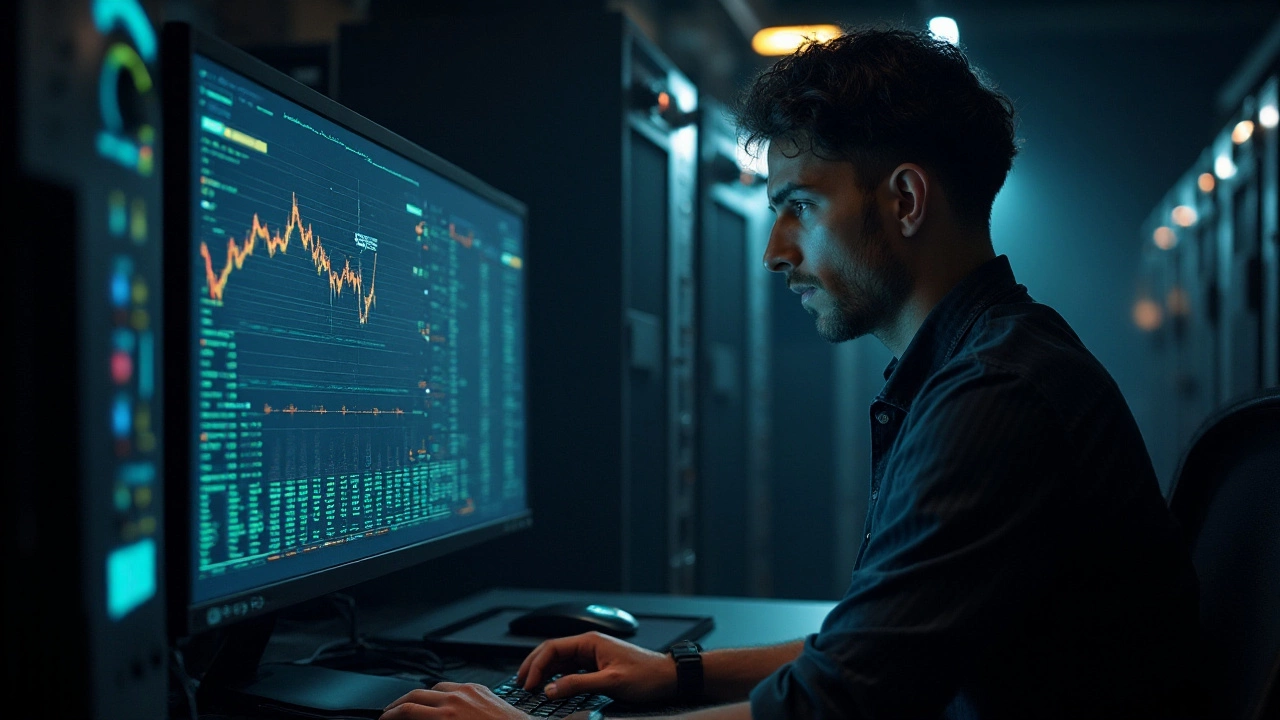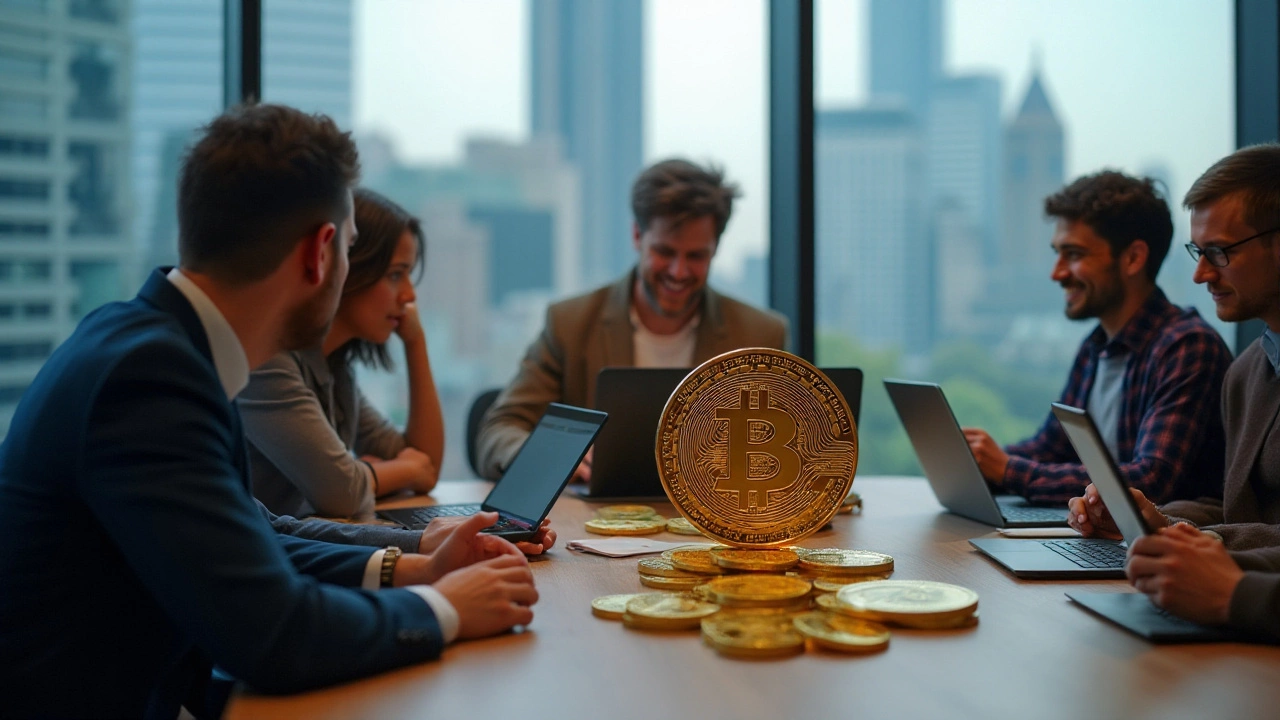Bitcoin has become a household name in recent years, attracting everyone from tech-savvy investors to curious newcomers. But what happens to your money when you decide to buy Bitcoin? While you might think the transaction is a straightforward exchange, there's more to the story. The journey of your money involves several players, each with their own role in the digital currency ecosystem.
Understanding these processes can be essential, especially for those looking to get serious about their cryptocurrency investments. Did you know that beyond exchanges, there are other entities like miners who play a crucial part in securing your transactions? And let's not forget the sometimes-overlooked transaction fees that can impact how much money ends up where.
For those willing to dive deeper, learning about these mechanics offers a strategic advantage. Whether you're a seasoned investor or a rookie taking your first steps, unraveling the inner workings of Bitcoin transactions could steer you towards smarter financial decisions. Read on to discover who really profits from your Bitcoin purchase.
- The Basics of Bitcoin Transactions
- The Role of Exchanges and Miners
- Transaction Fees and Beneficiaries
- Tips for Smart Bitcoin Investing
The Basics of Bitcoin Transactions
Understanding the Bitcoin transaction process starts with recognizing it as a digital message, much like an email but with value attached. When you decide to buy Bitcoin, what you're essentially doing is creating a message that states you're sending a certain amount of this digital currency from your account to another. This information gets broadcasted to the entire network for verification, ensuring that the sender has enough balance and hasn't already spent the currency elsewhere. This method of verification is what makes Bitcoin transactions both public and secure; anyone can see the transaction on the blockchain, the public ledger, but the identities behind the addresses remain private unless voluntarily disclosed.
The process begins the moment you initiate a transaction through a cryptocurrency exchange or directly from a digital wallet. Once initiated, your transaction joins a pool of others waiting for approval. It’s important to note that Bitcoin does not rely on a traditional bank system, which is often fraught with delays and fees. Instead, transactions rely on miners to verify and add them to the blockchain, using computational power to solve complex mathematical puzzles. This process, known as mining, is fundamental to maintaining the integrity of Bitcoin's decentralized system.
With every transaction you send, a small transaction fee is attached. This fee is an incentive for miners to include your transaction in the next block they verify. Transactions with higher fees generally get picked up and verified faster. Interestingly, it's this system of dynamic fees that helps regulate the flow and speed of transactions on the Bitcoin network. As a user, being aware of these fees helps you decide how urgent your transaction is; you can pay more to get it processed quickly or pay less and wait, like choosing express or standard shipping for a package.
Sometimes, to see how a transaction moves through the system, it's useful to track the fees, transaction time, and the miners at work. As of recent estimates, the global average transaction fee can fluctuate, depending upon the current network traffic and market demands. An interesting fact from 2022 revealed that during peak times, transaction fees could exceed $50, whereas slower periods might see fees lower than a dollar. Awareness of these variances can greatly inform your decision-making when sending or receiving Bitcoin. Keep this in mind the next time you decide to buy or send Bitcoin.

The Role of Exchanges and Miners
When you decide to purchase Bitcoin, the most likely gateway for this transaction is through a cryptocurrency exchange. These platforms, like Coinbase, Binance, or Kraken, serve as bustling marketplaces where buyers and sellers meet. They are the digital equivalent of a stock exchange, though far more accessible to the everyday investor. You might wonder how these exchanges make their money. It's primarily through a percentage-based transaction fee charged on each trade. While these fees might seem minor for small purchases, they add up to a substantial revenue stream for the exchanges, given the massive volumes of Bitcoin traded daily.
Exchanges play a crucial role not only in facilitating trades but also in maintaining liquidity in the Bitcoin market. They hold reserves to ensure that there is enough supply to meet demand, which helps stabilize prices and allows transactions to happen smoothly. Security is a significant concern for exchanges; they're custodians of both money and data. Hence, top exchanges invest heavily in security measures, audits, and insurance, protecting against hacking attempts and ensuring users' cryptocurrencies are safe and sound. Yet, the risks remain, and historical incidents like the infamous Mt. Gox hack remind us of the fragility of digital asset exchanges.
The Miners: Guardians of the Blockchain
Now, let's bring miners into the picture. Miners are vital players in the cryptocurrency ecosystem, acting as the gatekeepers of the Bitcoin network. They solve complex mathematical equations to validate and confirm transactions, a process known as mining. Miners compete to add a new block to the blockchain, a digital public ledger of all Bitcoin transactions. In return for their work, they are rewarded with newly created Bitcoin plus transaction fees, making it a lucrative yet highly competitive field. It's interesting to note that Bitcoin's design limits the creation of new Bitcoin over time, adding an element of scarcity that many investors find appealing.
An interesting fact is that as of recent years, Bitcoin miners collectively earn over $1 million daily in transaction fees alone, demonstrating just how rewarding their role can be. This fee is not a single charge but rather the sum of many smaller fees that each transaction contributes. It's a necessary cost to secure the network and process your purchase of Bitcoin. With the increasing computational power required to mine Bitcoin, the network's stability and security have become incredibly robust.
To ensure consistent service and competitive fee structures, it's always wise for investors to compare different exchanges and stay informed about miners' influence on transaction costs. As the world of cryptocurrency investing evolves, exchanges and miners will continue playing a dance of technological advancement and financial incentivization, ensuring the vibrancy and security of the Bitcoin ecosystem.

Transaction Fees and Beneficiaries
When you buy Bitcoin, you might notice a small amount deducted as a transaction fee. At first glance, this might seem like a minor detail, but it's a key aspect of the Bitcoin ecosystem. Transaction fees are fees paid to miners, those individuals or entities who contribute their computing power to secure and verify blockchain transactions. These fees are crucial because they help maintain the security and integrity of the Bitcoin network. Miners prioritize transactions with higher fees, a mechanism that acts as a natural balancer during periods of heavy network traffic, thus ensuring that transactions continue to flow smoothly.
The role of cryptocurrency exchanges in handling these transactions is also significant. Exchanges like Coinbase or Binance implement their own fee structures, which can vary based on transaction volume, type, or even the user's membership level. According to a 2022 study, the average Bitcoin transaction fee fluctuated between $1 to $5, influenced by market conditions and network congestion. This variability makes it important for investors to strategize their trades smartly, optimizing times when fees are lower to maximize their profits. It's an interesting perspective that while the transaction fee might sound like a ‘necessary evil’, it’s actually funding the backbone of Bitcoin’s operational network.
"The transaction fee is not just a small addendum to the cost of Bitcoin; it's a vote of confidence in the security and sustainability of the entire cryptocurrency architecture," said Dr. Jon Frost, a senior economist with an interest in digital currency systems. This sentiment highlights just how intrinsic these fees are to the functioning of the digital asset market infrastructure.
So who gets your money when you buy Bitcoin? A portion of it goes to these transaction fees which indirectly fund miners who maintain the network. This dynamic ensures that the Bitcoin blockchain remains reliable, decentralized, and secure — three pillars of the cryptocurrency world. With the increasing popularity of Bitcoin and continued technological advancements, there's a chance for faster transaction times and reduced fees, paving the way for an even more appealing user experience. For those navigating the world of digital assets, understanding these intricacies can make a big difference in the way you approach your transactions.

Tips for Smart Bitcoin Investing
Dipping your toes into the waters of Bitcoin investing? You're not alone. With its volatile nature and potential for high returns, Bitcoin continues to draw in both risk-takers and cautious investors. To navigate this new frontier of digital assets, one must first grasp the basics. Start by understanding the blockchain technology that underpins cryptocurrencies like Bitcoin. This knowledge lays the foundation for making informed decisions and not being swept away by market hype or unfounded speculation. Remember, education is your first line of defense against investing missteps.
Consider adopting a strategy known as dollar-cost averaging, where you invest a fixed amount regularly, rather than chasing the Bitcoin highs and lows. This helps mitigate the stress of timing the market and reduces emotional reactions to short-term price swings. It can be tempting to check prices every hour, but patience often proves beneficial. In line with this approach, always avoid putting all your eggs in one basket. Diversifying your investments across different asset classes can cushion your portfolio against adverse market movements.
Security should be a top priority when dealing with cryptocurrency. Keep your Bitcoin in a wallet rather than leaving it on an exchange, and enable two-factor authentication to add an extra layer of protection. Never divulge your private keys—these are the digital equivalent of a treasure map, leading directly to your crypto holdings. Speaking of which, remember to back up your wallet's recovery phrase or seed. Without it, you could lose access to your assets forever if anything happens to your hardware or software.
"The thing about Bitcoin is that it doesn’t care about you. It doesn’t care if you make a terrible decision, it doesn’t care if you’re not diligent. It’s neutral. In fact, that’s probably its greatest strength." — Andreas M. Antonopoulos
Stay vigilant and be wary of scams. Unfortunately, the rise of digital assets has also led to an increase in fraudulent schemes. Always verify the credibility of any platform or opportunity claiming to help you grow your investments rapidly. If it sounds too good to be true, it often is. Use dedicated forums and communities to stay updated about emerging threats and learn from the experiences of more seasoned investors.
For those inclined towards data, keeping an eye on market trends via analytics tools is beneficial. Various platforms offer charts and data on Bitcoin's historical performance, which can be instrumental in identifying patterns or potential breakout moments. By studying past trends, you might gain insights into where the market could be heading, though past performance is not always indicative of future results. Some investors like to go a step further, employing technical analysis to make predictions—though this requires practice and a solid understanding of market indicators.
Last but not least, define your investment goals clearly. Are you in for the short-term thrill of day trading or are you setting sights on long-term capital appreciation? Your goals will shape your strategy, guiding you through the peaks and troughs of the cryptocurrency investing landscape. Keep your emotions in check; it's crucial to maintain discipline and stick to your game plan, no matter how the market behaves.








